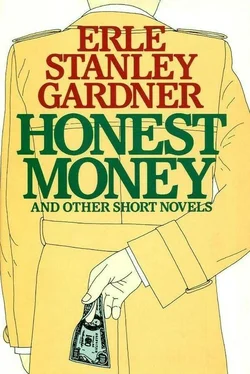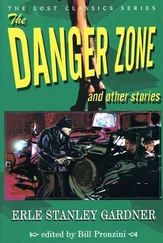“All right,” he said, “give me a chance to think things over a bit. Maybe I can work out something.”
“You’ve got to have something that you can tell a jury,” said Ken Corning slowly. “Something that the jury will believe; something that is going to sound logical, in spite of all the cross-examination a District Attorney gives you. In short, Driver, the only thing that will work is the truth.”
“But I told you the truth.”
“It doesn’t sound like it,” said Ken Corning grimly.
“To you, or to a jury?” asked Driver.
“Neither to me nor a jury,” Ken Corning said slowly.
Driver wet his lips nervously with the tip of his tongue, said nothing.
“Do you,” asked Ken Corning, taking a notebook from his pocket, “know a woman by the name of Ella Ambrose?”
Sam Driver nodded his head slowly.
“Yes,” he said, “she lives out there near where the folks are, on Hampshire Street.”
“What does she know about the case?” asked Corning.
The eyes of the prisoner sought his face, and, for the first time during the interview, became steady.
“Search me,” he said. “She can’t know anything about it.”
Corning nodded.
“Yes, she knows something about it. I can’t figure just what it is, but it’s something that she thinks is important. She wants me to come down to the house, after dark tonight, and not to let anyone know I’m coming. She sent me a message.”
Driver shook his head and made a simultaneous gesture with his shoulders and the palms of his hands.
“You better go see her,” he said. “Maybe she knows something, but be sure it’s something that’s going to help me. If it ain’t, get her out of the country.”
Corning suddenly snapped a swift question at the prisoner.
“Driver,” he said, “what did you do with the gun that killed Harry Green?”
For what seemed like three long seconds, Sam Driver sat with sagging jaw, and looked as though someone had slapped him in the face with a wet towel. His eyes bulged, and the muscles of his throat worked convulsively. Suddenly he said all in one breath: “Jeeze, boss, I never saw any gun. For gawd’s sake, don’t you go getting an idea like that through your head. How would I know what happened to the gun?”
Ken Corning got to his feet.
“That,” he said, “is just a mild sample of what the District Attorney is going to do to you on cross-examination. You’ve got to answer the questions better than that, or you’ll get murder in the first.”
Wind tugged at the skirts of Ken Corning’s overcoat as he stood on the dark street corner and strained his eyes at the shadowy houses, trying to see the numbers above the doors.
He moved forward, out of the circle of illumination cast by the street lamp, and became conscious of motion in the darkness.
He whirled and stood tense.
A lad of about twelve years of age came out from behind a board fence. He was leaning against the wind, and his cap was pulled down low against the tug of the gale. The light from the corner showed a young-old face, with shrewd, peering eyes, and a much frayed coat that was originally several sizes too large.
“You’re Ken Corning, the big lawyer?” the boy asked.
“Yes, I’m Corning.”
“My mom, she was afraid you couldn’t find the place, so she sent me to wait around,” said the boy.
“Who is your mother, lad?”
“Mrs. Ambrose. She’s the one you’re goin’ to see.”
Ken Corning nodded his head. “All right, son,” he said, “let’s go.”
The boy remarked in a swiftly nervous monotone, “We’d better cut through the alley. Mom’s afraid somebody may be watching the place.”
“Why should they watch the place?”
“I don’t know Mom told me not to talk nothing over with you, just to bring you to the house.”
The boy slipped through the gate in the fence. “Watch your step when you get around here,” he warned. “There’s a bunch of tin cans over there on the side.”
He moved unerringly, following some path which was invisible to the lawyer’s eyes. All above was smelly darkness. Houses fronted on the narrow street; houses that were cheap and unpretentious, yet were palaces beside the hovels which were scattered around the backs of the lots. All about were the sounds of human occupancy; low voices which carried through the flimsy walls of mean structures, the raucous blasts of a cheap radio which sounded from a living-room where comparative affluence announced its presence in strident tones.
The shadow grew deeper and Corning’s guide was but a blotch of black moving against a dark background. Abruptly he paused.
“This is the place,” said the boy, and started beating lightly with his knuckles on a door.
“Who is it?” asked thin, tired tones from the interior.
“It’s me, Mom.”
“Did he come with you?”
“Yeah. Open up.”
A bolt rasped back on the inside of the door, then, as the door swung open, an oblong of dim light from an oil lamp silhouetted the broad hips and shoulders of a heavy-set woman who hulked in the doorway.
“Come in,” said the woman.
Ken Corning stepped into the dark room. The woman pushed the door shut.
“I couldn’t understand,” said Corning, cautiously, “why you didn’t come to the office,”
The woman placed a linger to her lips, looked over at the boy. “Frank,” she said, “you run over and see if Jimmy won’t let you stay with him for a while.”
The boy turned the knob, held the door against the wind, slipped out into the night.
Ken Corning stared at the woman. She was in the early fifties. Adversity had stamped its mark upon her, and her face had set in lines of whining defiance, as though she had learned to cope with the world by aggressively protesting her rights with shrill-voiced insistence. Her features were heavy, the eyes small and sharp. The lower jaw was full and determined, but the upper part of the mouth seemed pinched, with a high, narrow roof.
“You’re defending Sam Driver?” she said.
Ken Corning nodded.
“Why didn’t you come to the office?”
“Because they got the place watched.”
“Who has?”
“I d’know. Maybe the police.”
“Why have they got the place watched?”
“I spoke out of turn,” she said.
“To whom?” Corning inquired.
“The cop on the beat. I told him that I didn’t think Sam Driver was guilty, and that I knew some stuff that would give him a break. The cop told me I’d better keep out of things that didn’t concern me. Right after that, men started to stand around in front of the house. They waited in automobiles, and poked around, as though they had business, but they didn’t fool me any. They were dicks, watching me.”
“All right,” said Ken Corning, “what do you know?”
She leered at him shrewdly.
“There’s got to be something in it for me,” she told him.
Slowly, Ken Corning shook his head.
“All the money that Sam Driver has,” he said, “is held by the law, on the theory that it belonged to Harry Green, the man he’s charged with killing. If I can get him acquitted, naturally he gets that money back. I’m going to take most of it for my fee. There’ll be some left for him and some for expenses. If he wants to make you a present after the case is over, that’s up to him.”
She twisted her fingers together and looked at Corning with avaricious eyes that took in every detail of his tailor-made clothes.
“Seems like it’s going to be pretty soft for you, if you get him off. Seems like I’d oughta have some cash.”
“No,” said Corning, “they’d ask you about that when you got on the witness stand. If you told them I’d given you a single nickel, they’d make it appear I’d bought your evidence.”
Читать дальше












